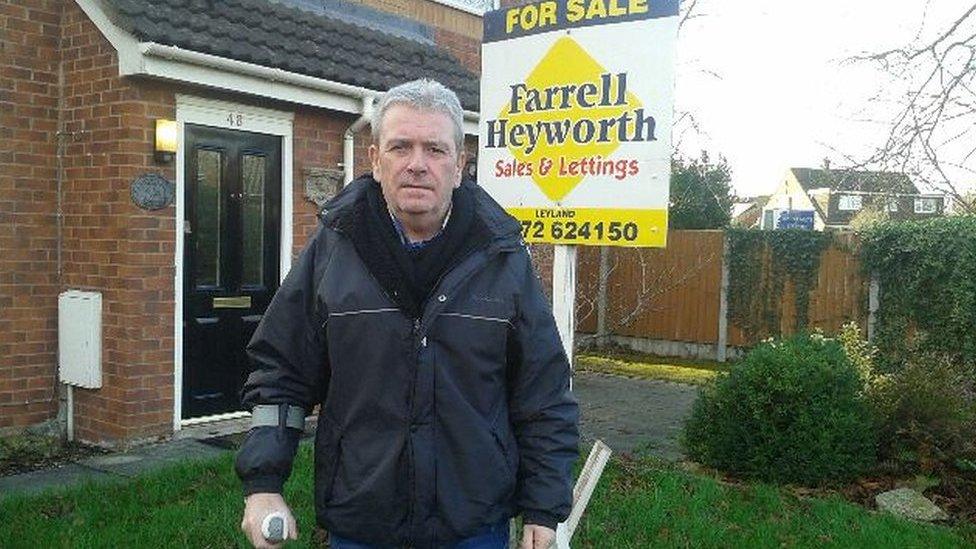DWP forces carer to sell home or face jail to repay benefits
- Published

George Henderson cares for his heroin-addicted 37-year-old son
A carer is being forced to sell his home or face jail because he wrongly received benefits that cost the taxpayer less than £110.
George Henderson, 59, from Leyland in Lancashire, looks after his 37-year-old son, John, who has mental health problems and is addicted to heroin.
George has cared for his son all of his life, without payment.
In August 2010, a Department for Work and Pensions official visited to ensure John was getting the right benefits.
While he was there, George asked whether he could claim carer's allowance.
The DWP official explained that there would be no merit in doing so, because George gaining carer's allowance would mean John losing the severe disability premium. The amounts were roughly the same.
However, George thought he could see a big advantage: it would help him manage his son's income so he could not spend it all on heroin.
"I would be in control of some of John's money. I would give him that money back on a daily basis, not the drug dealer taking it off him every fortnight when he was standing at the cash machine," he said.
What George did not realise - and the DWP official did not tell him - is that his work for a taxi firm, earning well over £120 a week, meant he was not entitled to carer's allowance.
There are strict rules for claiming that benefit. Earning even 1p more than £120 a week means recipients lose the entire £64.60 weekly payment.
''Not once did he [the DWP official] mention anything about employment, about how much you could earn, nothing at all," George said.
The disability benefit his son lost is now worth £64.30 a week, while the carer's allowance that George claimed is now worth £64.60 - a difference of an extra 30 pence a week.
'I don't owe a penny'
For more than six years, the Department for Work and Pensions failed to notice that George was paying tax on his earnings and had received £19,500 carer's allowance.
But then it decided to prosecute him for fraud over a mistake that cost it just 30p a week. George pleaded not guilty.
"As far as I was concerned, I never done anything wrong. I don't owe the DWP a penny. They took it off my son, gave it to me, who gave it back to my son as caring for him," he said.
"So the money that came off my son is the same amount of money as the DWP are actually trying to take back off me."
At his trial at Preston Crown Court in August, George was found guilty of fraud. He was fined, given a 32-week suspended sentence and electronically tagged. He began paying back the money in monthly instalments.
Last month, the DWP used the Proceeds of Crime Act to force George to sell his home and pay back all £20,900 of overpaid carer's allowance plus fines by 14 February. He faces seven months in jail for failing to do so.
George accepts that when applying for carer's allowance, he wrongly ticked the box that said he was unemployed. He can't remember why, but explains: "The only thing I can think is that I've ticked that box thinking the question is about my son. But it was a total mistake."
'Shocking ineptitude'
George believes the DWP is to blame for not spotting the error more quickly.
He is one of nearly 70,000 unpaid carers who the DWP is now pursuing for arrears of hundreds, thousands or even tens of thousands of pounds.
'If they're not checking and telling these people the rights and the wrongs, and then claiming x amount of money after a 7-year period, I think it's ludicrous. It's beyond a joke'.
Frank Field, chair of the Work and Pensions Committee, has accused the DWP of "shocking ineptitude" and asked the National Audit Office to investigate urgently.
"Such eye-wateringly large overpayments suggest that systemic failings or gross incompetence - or a combination of the two - are at play," he said.
The DWP estimates it overpays £160m in carer's allowance a year and is now trying to claw back some of that money.
"We have a duty to the taxpayer to recover outstanding money in all cases of fraud or error, but there are safeguards in place to ensure repayments take into account people's individual circumstances," a spokesperson said.
George is about to have the first of two hip operations. But when he leaves hospital, he's worried he'll have nowhere to live: "Will I be homeless? Will I be in a hostel? I've really no idea."
Listen to the full story from Money Box here.